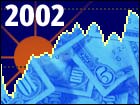Recession may already be over
Most economists in a recent survey think downturn over, see modest growth in 2002.
February 22, 2002: 11:45 a.m. ET
|
 NEW YORK (CNN/Money) - One of the mildest recessions in U.S. history may already be over, according to a recent survey of economists, who expect a "hearty, though not spectacular" recovery by 2003.
NEW YORK (CNN/Money) - One of the mildest recessions in U.S. history may already be over, according to a recent survey of economists, who expect a "hearty, though not spectacular" recovery by 2003.
The National Association for Business Economics said Thursday that 60 percent of 37 economists it surveyed in February think the first U.S. recession in a decade already is over. Just two of the economists surveyed thought a return to growth wouldn't come until the second quarter of 2002.
"America's longest expansion in history has been followed by one of the shortest, shallowest recessions on record," NABE President Harvey Rosenblum said. "The resilient economy has weathered a series of shocks remarkably well. It should pick up steam by the second half of this year and maintain 3.5 percent to 4 percent growth throughout 2003."
Though most of the economists thought inflation would remain low in 2002, more than 90 percent of them thought the Federal Reserve would start raising interest rates by the second half of the year to keep inflation at bay.
The Fed cut its target for short-term rates 11 times in 2001, a record for a calendar year, in an effort to keep consumers spending despite a downturn that was worsened by the Sept. 11 terrorist attacks.
Though the recession has not seemed particularly mild to the more than 1.4 million Americans who have lost their jobs since April 2001, it has been lighter than other recent downturns.
For example, 2.57 million jobs were lost during the 1981-82 recession, while the 1974-75 recession brought 2.27 million job cuts. The last recession, in 1990-91, saw 1.76 million cuts.
And gross domestic product (GDP), the broadest measure of economic strength, may have shrunk in only one quarter, the third quarter of 2001. The government's first estimate of fourth-quarter GDP was slightly positive, meaning the common definition of a recession - two straight quarters of shrinking GDP - may have been avoided.
Still, businesses may not be done cutting jobs, and the unemployment rate - a lagging indicator that often rises even as the economy recovers - could average 6.0 percent this year, the NABE panelists said.
Click here for CNN/Money's economic calendar
The NABE also asked the economists for their theories about what caused the recession, which followed the longest continuous economic expansion in U.S. history. The primary suspect was a glut of business spending in the late 1990s, which led to an overhang of inventories and production capacity in factories.
Correcting that imbalance led to a dramatic slowdown in manufacturing activity and a recession in the sector that's lasted for more than a year.
"Too much exuberance about future returns that leads business to install too much capacity is a classic recipe for an economic hangover," Maureen Allen, chief economist at Zurich Scudder Investments, wrote in the NABE's report.
The Sept. 11 attacks came in a "very close second," and most of the economists said they thought a recession could have been avoided if not for the attacks. In that respect, they agree with the highly regarded National Bureau of Economic Research, which dates recessions based on specific data such as employment and said last year that the economic expansion of the 1990s ended in March 2001.
Still, Sept. 11 should have no long-term negative impact on the economy's ability to grow, the NABE economists said, a view shared by Fed Chairman Alan Greenspan and most other observers.

|
| SPECIAL: |
|
|
|
|
|

|

